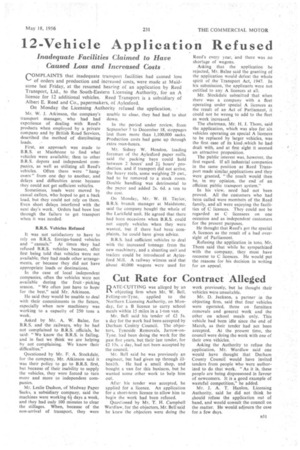12-Vehicle Application Refused
Page 39

If you've noticed an error in this article please click here to report it so we can fix it.
Inadequate Facilities Claimed to Have Caused Loss and Increased Costs .
COMPLAINTS that inadequate transport facilities had caused loss of orders and production and increased costs, were made at Maidstone last Friday, at the resumed hearing of an application by Reed Transport, Ltd., lb the South-Eastern Licensing Authority, for an A licence for 12 additional vehicles. Reed Transport is a subsidiary of Albert E. Reed and Co., papermakers, of Aylesford.
On Monday the Licensing Authority refused the application.
Mr. W. J. Atkinson, the comphny's transport manager, who had had experience of dealing with Reed's products when employed by a private company and by British Road Services, described the method of distributing loads.
First, an approach was made to B.R.S. at Maidstone to find what vehicles were available; then to other B.R.S. depots and independent companies, as well as utilizing all Reed's vehicles. Often there were " hangovers " from one day to another, and delays and difficulties arose because they could not get sufficient vehicles.
Sometimes, loads were moved by casual callers, who hoped to get a back load, but they could not rely on them. Even short delays interfered with the next day's work. Orders had been lost through the failure to get transport when it was needed.
B.R.S. Vehicles Refused
It was not satisfactory to have to rely on B.R.S. foreign-based vehicles and "casuals." At times they had refused B.R.S. vehicles because, after first being told that vehicles were not available, they had made other arrangements, or because they did not have appropriate loads or destinations.
In the case of local independent companies, often the vehicles were not available during the fruit picking season. "We often just have to hope for the best," said Mr. Atkinson, He said they would be unable to deal with their commitments in the future, especially when new machinery was working to a capacity of 250 tons a week.
Asked by Mr. A. W. Balne, for B.R.S. and the railways, why he had not complained to B.R.S. officials, be said: "We know the B.R.S. is failing, and in fact we think we are helping by not complaining. We know their difficulties."
Questioned by Mr. F. A. Stockdale, for the company, Mr. Atkinson said it was their policy to go to B.R.S. first, but because of their inability to supply the vehicles, they were forced to turn more and more to independent companies.
Mr. Leslie Dadson, of Medway Paper Sacks, a subsidiary company, said the machines were working 64 days a week, and they had 'only 100 minutes to clear the stillages. When, because of the non-arrival of transport, they were unable to clear, they had had to shut down.
In the period under review, from September 5 to December 18, stoppages lost them more than 1,100,000 sacks. Production costs had gpne up through extra man-hours,
Mr. Sidney W. Hendon, loading foreman of the Aylesford paper mills, said the packing bays could hold between 2 hours' and 24 hours' production, and if transport did not arrive, the heavy reels, some weighing 29 cwt., had to be removed to a stock room. Double handling was detrimental to the paper and added 2s. 6d. a ton to the cost.
On Monday, Mr.. W. H. Taylor, B.R.S. branch manager at Maidstone, said the company bought the whole of the Larkfield unit. He agreed that there had been occasions when B.R.S. could not supply vehicles when they were wanted, but if there had been complaints, he-could have given advice.
B.R.S. had sufficient vehicles to deal with the increased' tonnage from the new machinery, and a shunting unit and trailers could be introduced at Aylesford Mill. A railway witness said that about 40,000 wagons were used for
Reed's every year, and there was no shortage of wagons.
Asking that the application be rejected, Mr. Balne said the granting of the application would defeat the whole spirit of the Transport Act, 1947. In his submission, the applicants were not entitled to any A licences at all.
Mr. Stockdale submitted that when there was a company with a fleet operating under special A licences as the result of an Act of Parliament, it could not be wrong to add to the fleet as work increased.
The chairman, Mr. H. J. Thom, said the application, which was also for six vehicles operating on special A licences to be replaced by larger vehicles, was the first.case of its kind.which he had dealt with, and at first sight it seemed an attractive proposition.
The public interest was, however, the first regard. If all industrial companies in the same position as Reed Transport made similar applications and they were granted, "tie result would then be, in my opinion, the end of an efficient public transport system."
• In his view, need had not been proved. All the customers who had been called were members of the Reed family, and all were enjoying the facilities of C licences. They could not be regarded as C licensees on one occasion and as independent customers for the present purposes.
He thought that Reed's got the special A licences as the result of a bad over sight of Parliament. • Refusing the application in toto, Mr. Thom said that while he sympathized with the company, they must have recourse to C licences. He would put the reasons for his decision in writing for an appeal.
















































































































